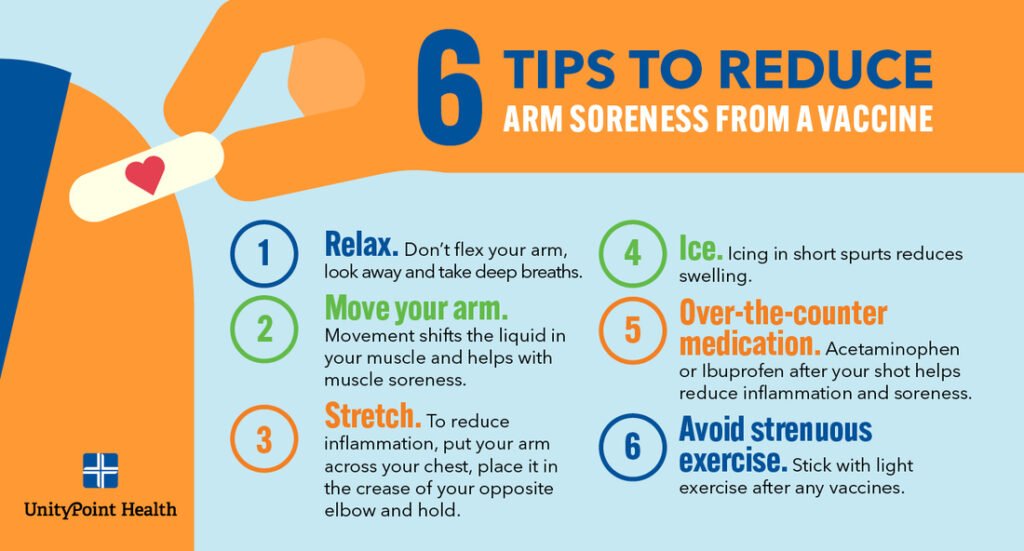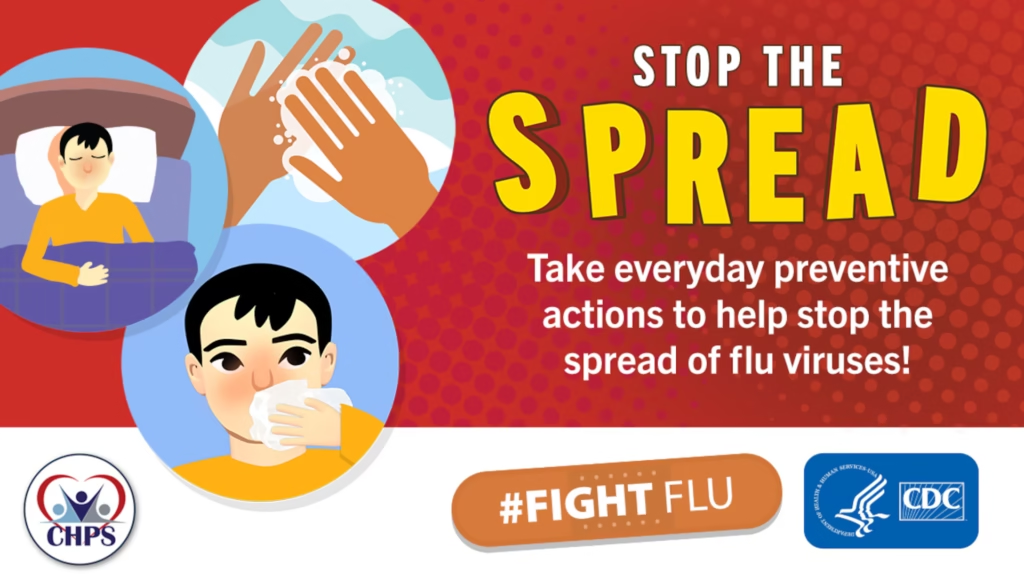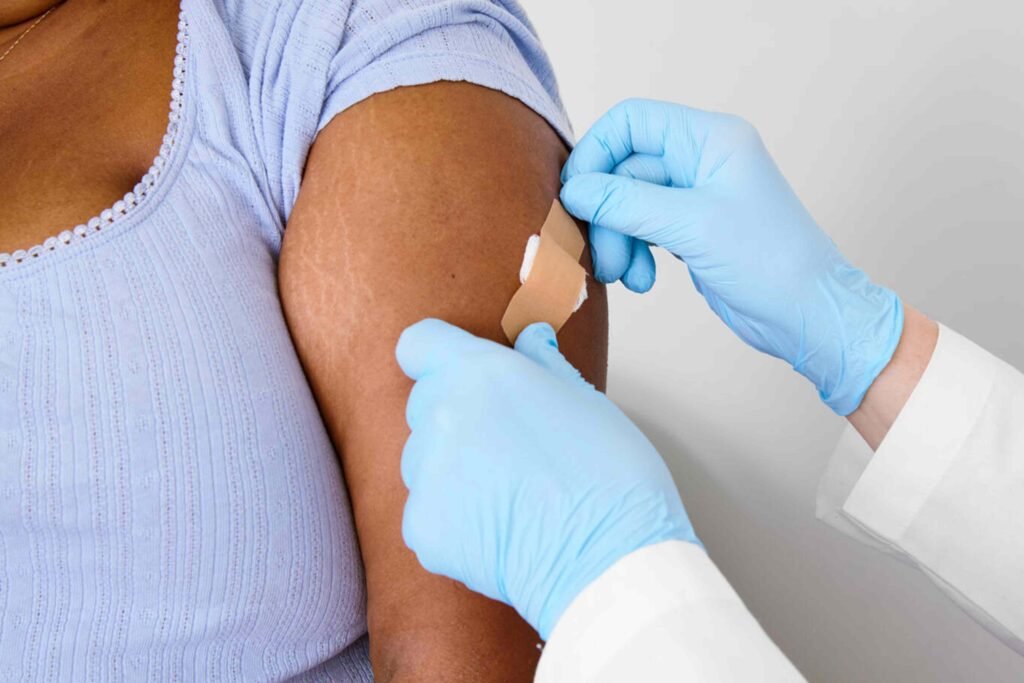Introduction
Getting a flu shot is one of the simplest and most effective ways to protect yourself, your family, and your community from seasonal influenza. Each year, millions of people receive this vaccine to reduce the risk of serious illness, hospitalization, or complications caused by the flu virus. While getting the shot itself is quick, many people wonder what happens afterward. Should you avoid certain foods, drinks, or activities after a flu shot? Are there habits that could make side effects worse or reduce the vaccine’s effectiveness?
The good news is that for most people, the flu shot is very safe and has minimal restrictions. However, there are a few smart things you can do — and some things you should avoid — to help your body recover comfortably and build a stronger immune response. Here’s a complete, practical guide to what to avoid after your flu shot and how to care for yourself afterward.

Understanding What Happens After a Flu Shot
Once you receive the flu vaccine, your body begins building protection against the specific strains of the virus included in that year’s formulation. The vaccine contains inactivated or recombinant viral particles that cannot cause the flu, but they “train” your immune system to recognize and fight the virus effectively.
This immune activation process triggers mild, temporary reactions such as soreness at the injection site, low-grade fever, fatigue, or muscle aches. These are normal signs that your immune system is working. It usually takes about two weeks for your body to develop full immunity. During this time, it’s important to treat your body gently, avoid unnecessary stressors, and support the immune process with rest, hydration, and good nutrition.
1. Avoid Heavy Alcohol Consumption
Alcohol can temporarily weaken your immune system and dehydrate your body. After your flu shot, your immune system needs to work efficiently to build antibodies. Heavy drinking during this period can interfere with that process, increase fatigue, and worsen side effects like headaches or nausea.
While a small amount of alcohol is unlikely to cause serious harm, it’s best to skip or limit alcoholic beverages for at least 24 to 48 hours after vaccination. Give your body time to recover and focus on hydration instead — water, herbal teas, or electrolyte-rich fluids are your best choices.
2. Avoid Intense Physical Exercise
Exercise is great for overall health, but high-intensity workouts immediately after your flu shot can strain your muscles and worsen soreness in the vaccinated arm. Your immune system also needs energy to mount its response, and pushing yourself too hard physically can make you feel drained or dizzy.
For the first day or two, opt for light activities such as walking, stretching, or yoga instead of heavy lifting, running, or endurance training. Gentle movement can help prevent stiffness and improve blood flow to the injection site, promoting faster recovery.
3. Avoid Taking Painkillers Before or Immediately After the Shot
It’s common to feel mild pain or tenderness at the injection site, and many people reach for over-the-counter painkillers right away. However, taking medications like ibuprofen or acetaminophen before or immediately after your flu shot may slightly reduce your body’s immune response.
Studies suggest that anti-inflammatory drugs can dampen the activity of immune cells responsible for producing antibodies. It’s best to avoid them unless you truly need relief. If you experience significant pain, fever, or discomfort a few hours after the shot, you can safely take these medications as directed. But don’t take them preemptively “just in case.”

4. Avoid Highly Processed or Sugary Foods
Nutrition plays a key role in how your immune system functions. Foods high in sugar, refined carbohydrates, and unhealthy fats can increase inflammation and make you feel sluggish, especially after vaccination.
For a day or two after your flu shot, try to limit fried foods, sweets, fast food, and soda. Instead, focus on nourishing options such as:
- Fruits and vegetables rich in vitamins A, C, and E
- Whole grains and legumes
- Lean proteins such as fish, chicken, tofu, or eggs
- Hydrating foods like soups, broths, and smoothies
These nutrients support your immune system, help with recovery, and keep you feeling energized.
5. Avoid Smoking or Vaping
Both smoking and vaping introduce toxins that can stress your lungs and immune system. They may also slow down the healing process and increase inflammation. Avoiding smoking for at least a day after vaccination gives your body the best chance to focus on building immunity.
If you already plan to quit or cut back, getting a flu shot can be a great motivation to start that healthier habit.
6. Avoid Skipping Rest and Sleep
Sleep is one of the most powerful tools for immune support. During rest, your body produces cytokines and antibodies that help fight infection and strengthen vaccine response.
Lack of sleep can weaken these processes, making side effects like fatigue or soreness more noticeable. Aim for at least seven to eight hours of good-quality sleep the night after your flu shot, and listen to your body — if you feel tired, rest. Recovery is not a sign of weakness; it’s your immune system at work.
7. Avoid Close Contact with Sick People
Even though you’ve received the vaccine, it takes about two weeks for full protection to develop. During this period, you are still susceptible to catching the flu or other respiratory viruses.
Try to avoid crowded or poorly ventilated spaces, and minimize close contact with anyone who is coughing, sneezing, or showing flu-like symptoms. Continue good hygiene practices — frequent hand washing, using sanitizer, and covering your mouth when coughing — to protect yourself and others.
8. Avoid Ignoring Unusual Symptoms
Mild side effects after a flu shot are completely normal and usually go away within 24 to 48 hours. However, you should not ignore symptoms that seem severe or unusual.
Seek medical attention if you experience:
- Difficulty breathing or swallowing
- Swelling of the face, lips, or throat
- Persistent high fever
- Rash, dizziness, or severe pain at the injection site
- Weakness or numbness in limbs
These may indicate an allergic reaction or another medical issue that needs immediate care. Remember, serious reactions are extremely rare, but it’s always better to be cautious.

9. Avoid Overexertion and Stress
Mental and physical stress can lower immune efficiency. After your flu shot, avoid overworking, skipping meals, or staying up late. Stress hormones like cortisol can interfere with your body’s ability to build a strong immune response.
Try relaxation techniques such as deep breathing, gentle stretching, or meditation to keep stress levels in check. This helps your body recover faster and supports overall well-being.
How to Support Your Body After the Flu Shot
While knowing what to avoid is helpful, it’s just as important to know what to do to recover smoothly. Here are some practical care tips:
- Stay hydrated: Drink plenty of water to flush out toxins and prevent headaches or fatigue.
- Move your arm: Lightly move or stretch the vaccinated arm to reduce stiffness and soreness.
- Use a cold compress: Apply it gently on the injection site to ease discomfort.
- Eat nutritious meals: Include foods rich in vitamins, minerals, and antioxidants.
- Rest well: Give your immune system time to respond effectively.
- Monitor your symptoms: Keep an eye on your body for the first 48 hours.
By following these steps, you’re helping your body build strong, lasting protection against the flu.
Common Myths About the Flu Shot
“The flu shot can give you the flu.”
This is false. The vaccine contains inactivated or noninfectious components of the virus, which means it cannot cause flu illness.
“You don’t need a flu shot every year.”
Also false. Flu viruses constantly change, so the vaccine is updated yearly. Annual vaccination ensures protection against current strains.
“If you’re healthy, you don’t need the vaccine.”
Even healthy individuals can get the flu and spread it to others. Vaccination protects you and helps prevent outbreaks.
“Flu shots don’t work.”
While no vaccine offers 100% protection, flu shots significantly reduce the risk of infection and serious complications. Even if you get sick, your symptoms will likely be milder.
Read More: Remedios efectivos para las hemorroides: alivio rápido
Conclusion
After getting your flu shot, your job is simple: give your body the best chance to do its work. Avoid alcohol, strenuous exercise, and processed foods for a couple of days. Skip unnecessary medications, rest well, and stay hydrated. Watch for any unusual symptoms and avoid contact with people who are sick until your immunity fully develops.
The flu shot is a small investment of time that pays off with big protection. By taking a few easy precautions after your vaccination, you’ll help your immune system build stronger defenses and reduce the risk of discomfort. Protecting yourself from the flu doesn’t stop at the clinic — it continues with how you care for yourself afterward. Stay mindful, stay healthy, and give your body the support it needs to keep you safe all season long.
FAQs
1. What should I avoid doing after a flu shot?
Avoid drinking alcohol, overexercising, smoking, eating junk food, and taking unnecessary painkillers. Rest and hydrate instead.
2. Can I exercise after getting the flu shot?
Light exercise is fine, but avoid heavy workouts for 24 to 48 hours if you feel sore or tired.
3. Is it okay to drink alcohol after a flu shot?
It’s best to limit or avoid alcohol for a day or two to help your immune system respond effectively.
4. Can I take ibuprofen or paracetamol after my flu shot?
You can take them if you develop pain or fever, but avoid taking them beforehand as they might slightly affect immune response.
5. How long should I rest after getting the flu shot?
Most people can resume normal activities within a day, but it’s wise to rest and stay hydrated for 24 to 48 hours.